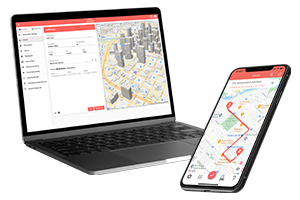Last updated on: January 6, 2022
If your company mostly deals with transporting goods or you just simply need your employees to be mobile and you need to provide some kind of means of transport, you have two options to choose from: you can either provide them with a company car or have them use their personal vehicle for work.
Both solutions have some tax-related consequences you have to consider first. Let’s review them, to see which one pays off more.
Company cars
If you decide to provide a company car, it is considered as a fringe benefit, more precisely as a working condition benefit which is, according to the IRS, “property and services you provide to an employee so that the employee can perform his or her job.” If the company is the owner of the vehicle it doesn’t really matter whether you’re the Business Owner or an Employee, you have to have proof of the Business mileage you drove, as only this part of your mileage is deductible as a Business expense.
But there’s more. You have to provide documentary evidence about the Mileage you drove. To see why let’s dive into the world of the tax implications of company cars.
Company Vehicle Policies
You can create a Reimbursement Plan, by providing a car allowance to your employees. This reimbursement is the compensation for the expenses of driving a Company car for Business purposes. If it’s an Accountable Plan (IRS classification), it is not a taxable benefit to the employee. The allowance needs to be based on substantiation (adequate documentary evidence) and if there’s an excess amount at the end of the month, it needs to be returned within a reasonable amount of time.
And you’ll need to keep a mileage log for that.
You can determine the Vehicle Allowance of your Company using the Actual Expense Method (logging every expense related to your car) or by considering the IRS’ Standard Mileage Rate (the 2022 Standard Mileage Rate is: 58.5 cents per mile for the first half and 62.5 cents per mile for the second half of the year for business purposes).
There are a few varieties of plans you can consider and then implement, depending on which one suits the needs of your company the best. Don’t forget to take into account the local gas prices, maintenance costs, toll fees, and other parameters specific to your field and place of business.
If you don’t have any policy in place, any reimbursement will be taxable to your employee, and the employer has to include the amount in the employee’s paycheck, which implicates tax withholding as well.
Personal cars
Using Personal cars for Business purposes requires much less planning and administration. It means less cost for the business. Whether it is investing in a company fleet, leasing cars, trucks, or vans, or just paying for the maintenance. It also comes with fewer tax reporting requirements.
In this case, the employee has to keep a Mileage log and provide the employee with accurate, detailed reports.
It is still common practice to keep track of the mileage on paper, later transferring it to Excel spreadsheets. Using this method you could never be sure about whether you left some errors in the figures somewhere or not.
And to hear it from an IRS inspector, who will surely spot the mistakes and miscalculations, is painful. And more than that: pricey too.
You can speed up this crucial and time-consuming process by using MileageWise! And speed is not the only benefit of a Mileage Log Web Dashboard and Mileage Tracker App solution.
We know that it’s almost impossible to keep all the legislation in mind for the recent tax years.
Not to mention forgotten drives. We only realize the error when we notice the difference between our end-of-month odometer reading and the mileage we recorded. And to retrospectively modify a Mileage log is very difficult.
Specifically for this problem, MileageWise has a feature called the AI Wizard feature: just give us a few parameters, like the basis for your payoff (your end-of-month odometer reading or the business miles you would like to deduct), the daily maximum amount of driveable trips or distance and we can make you a personalized Mileage log Recommendation, which will correspond to the exact mileage you have driven according to your odometer, even retrospectively.
In the process, the Built-In IRS Auditor checks and corrects 70 logical conflicts, so your mileage log will be IRS-proof, meeting every expectation for sure.




